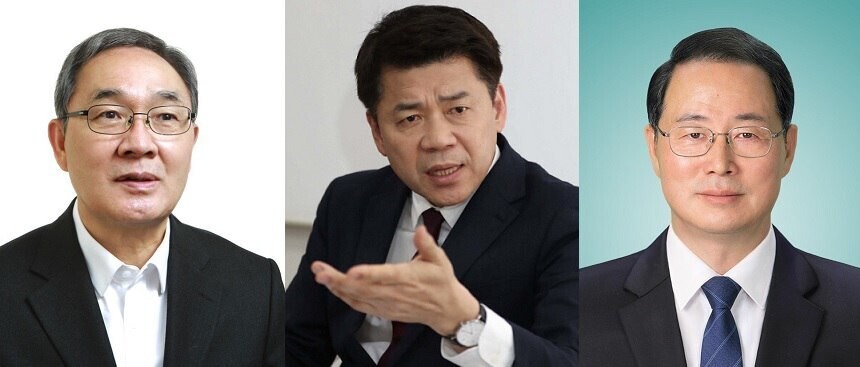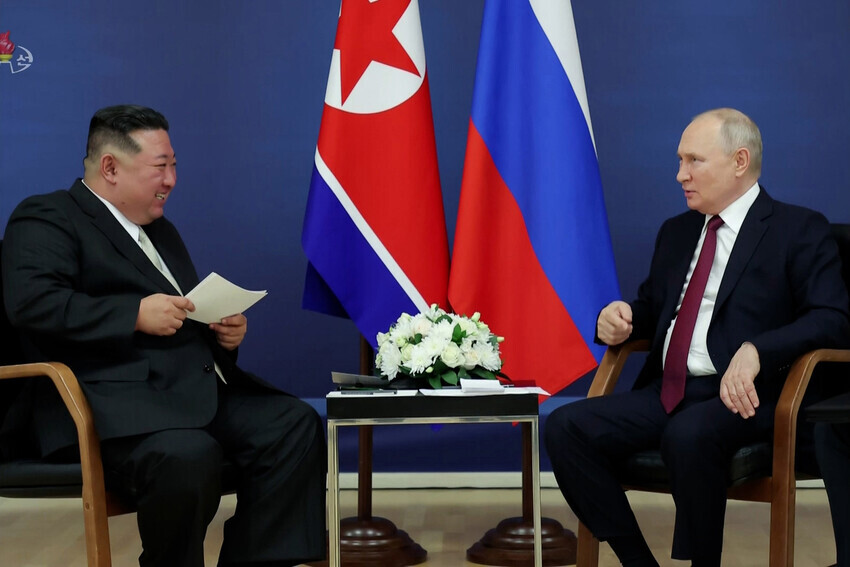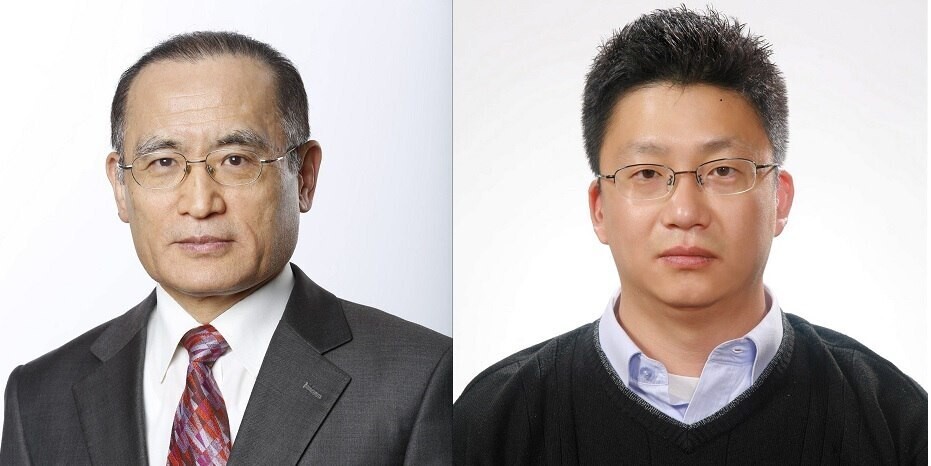hankyoreh
Links to other country sites 다른 나라 사이트 링크
Seoul must respond to Pyongyang-Moscow ties with pragmatism, not ideology, say experts

Foreign policy experts assessed that the summit between North Korean leader Kim Jong-un and Russian President Vladimir Putin on Wednesday elevated ties between their respective countries to an unprecedented level.
At the same time, they analyzed that South Korea’s relations with Russia will face the roughest patch yet and advised that Seoul base its foreign policy toward North Korea, China and Russia on practical interests and flexibility rather than ideology.
On Thursday, the Hankyoreh asked five experts — Kim Joon-hyung, the former chancellor of the Korea National Diplomatic Academy; Park Byung-hwan, the director of the Eurasia Strategy Research Institute; University of North Korean Studies professor Yang Moo-jin; Wi Sung-lac, the former South Korean ambassador to Russia; and Jeh Sung-hoon, a professor of Russian studies at Hankuk University of Foreign Studies — about their thoughts, analyses and predictions following the recent North Korea-Russia summit.

New milestone in Pyongyang-Moscow relations
Experts the Hankyoreh consulted said Pyongyang and Moscow solidified their relations to a level previously unseen through their recent summit. Wi remarked that the meeting between Kim Jong-un and Putin “highlighted the drastic advancement of North Korea-Russia relations,” adding that “the summit’s seeming disregard for international norms and existing UN Security Council sanctions resolutions especially shocked the international community.”
Commenting that the summit “signified a new milestone for North Korea-Russia relations,” Jeh also stated, “The West’s sanctions against Russia, prompted by the country’s war in Ukraine, forced Russia to make a new decision, which North Korea utilized, giving rise to new relations between North Korea and Russia. This is a product of changes brought to the international community by the war in Ukraine.”
Experts believed the new Cold War structure on and around the Korean Peninsula has become further entrenched as a result of the summit. “Russia seems to be attempting to use North Korea as its supply base for its war in Ukraine,” said Yang. “The recent summit heightened confrontation between South Korea, the US and Japan on one side and North Korea and Russia on the other, as well as the new Cold War structure.”
Kim Joon-hyung also observed, “After the conclusion of the South Korea-US-Japan summit at Camp David last month, I predicted that the new Cold War would kick off in full swing, and things definitely seem to be going in that direction.”
Uncertainty about level of arms deals
Another thing experts predicted was the expansion of exchange between North Korea and Russia in various fields including economic and military matters. However, their views were divided in terms of the extent to which the two countries will begin trading in arms.
While Putin expressed his intent to support Pyongyang’s development of satellites, the Kremlin stated that it would cooperate with North Korea in “sensitive areas that can’t be disclosed,” implying that North Korea will be supplying conventional weapons to Russia as it continues its war efforts in Ukraine.
“Though the two countries won’t admit it, the issue of [North Korea] supplying weapons [to Russia] was probably discussed,” estimated Wi, who noted Putin’s affirmative attitude towards the possibility of transferring technology for satellites to North Korea. “Satellites can also be used for military reconnaissance purposes,” he added.
“It appears that North Korea promised to provide artillery shells [to Russia], while Russia promised to provide technical assistance regarding spy satellites,” Yang pointed out.
In contrast, Kim Joon-hyung noted that it is “difficult” to conclude that Russia decided to transfer sensitive military technology to North Korea through this summit alone, explaining, “Russia will determine its level of military cooperation with North Korea based on South Korea’s attitude regarding the war in Ukraine moving forward.”
Jeh also noted the lack of details. “Russia said it would help North Korea launch a satellite and cooperate on space activities, but nothing specific was mentioned concerning military cooperation,” the professor said. “It appears specific details weren’t agreed upon during the recent summit.”

Likelihood of adding China to the equation
While estimating that North Korea and Russia will attempt to expand their cooperation with China following their recent summit, experts doubted the three countries would grow as close as South Korea, the US and Japan.
“China appears to be judging that, in order to respond to trilateral cooperation among South Korea, the US and Japan, solidarity among North Korea, China and Russia has to be bolstered,” Jeh commented. “China may remain cautious against the possible reenactment of North Korea’s diplomatic habit of trying to use China and the Soviet Union to their advantage during the Cold War.”
Meanwhile, Park said, “After World War II, Russia, China and North Korea engaged in a triangular relationship of solidarity as well as containment. I’m pessimistic that the three countries could band together as closely as South Korea, the US and Japan.”
Wi stated, “China seems to be sympathizing with Russia’s opposition against the US-led order in Northeast Asia. As such, it will join forces with Russia in the big picture.”
Seoul needs to look at diplomacy in terms of pragmatism, not ideology
Pointing out the diplomatic challenges ahead of the Yoon Suk-yeol administration in Seoul, experts urged it to break away from its ideology-driven diplomacy and conduct pragmatic diplomacy with North Korea, China and Russia.
“The North Korea-Russia summit exposed the ultimate failure of the Yoon administration’s diplomatic line,” Jeh assessed, adding that the administration “narrowed its options by making rash and ideological decisions at a time the international order is at a major transition.”
“In order to break through this, it has no choice but to carry out deep discussions with China and Russia,” Jeh continued.
Wi commented, “Mutual cooperation with the US and Japan will result in the opportunity cost of opposition from North Korea, China and Russia for South Korea.” He went on, “Right now, the Yoon administration appears to only have a plan for the US and Japan in terms of foreign policy and doesn’t seem to have anything concrete concerning China and Russia.”
By Shin Hyeong-cheol, staff reporter
Please direct questions or comments to [english@hani.co.kr]

Editorial・opinion
![[Editorial] Intensifying US-China rivalry means Seoul must address uncertainty with Beijing sooner than later [Editorial] Intensifying US-China rivalry means Seoul must address uncertainty with Beijing sooner than later](https://flexible.img.hani.co.kr/flexible/normal/500/300/imgdb/original/2024/0517/8117159322045222.jpg) [Editorial] Intensifying US-China rivalry means Seoul must address uncertainty with Beijing sooner than later
[Editorial] Intensifying US-China rivalry means Seoul must address uncertainty with Beijing sooner than later![[Column] When ‘fairness’ means hate and violence [Column] When ‘fairness’ means hate and violence](https://flexible.img.hani.co.kr/flexible/normal/500/300/imgdb/original/2024/0516/7417158465908824.jpg) [Column] When ‘fairness’ means hate and violence
[Column] When ‘fairness’ means hate and violence- [Editorial] Yoon must stop abusing authority to shield himself from investigation
- [Column] US troop withdrawal from Korea could be the Acheson Line all over
- [Column] How to win back readers who’ve turned to YouTube for news
- [Column] Welcome to the president’s pity party
- [Editorial] Korea must respond firmly to Japan’s attempt to usurp Line
- [Editorial] Transfers of prosecutors investigating Korea’s first lady send chilling message
- [Column] Will Seoul’s ties with Moscow really recover on their own?
- [Column] Samsung’s ‘lost decade’ and Lee Jae-yong’s mismatched chopsticks
Most viewed articles
- 1For new generation of Chinese artists, discontent is disobedience
- 2[Editorial] Transfers of prosecutors investigating Korea’s first lady send chilling message
- 3S. Korea “monitoring developments” after report of secret Chinese police station in Seoul
- 4Xi, Putin ‘oppose acts of military intimidation’ against N. Korea by US in joint statement
- 5[Exclusive] Unearthed memo suggests Gwangju Uprising missing may have been cremated
- 6N. Korean media upgrades epithet for leader’s daughter from “beloved” to “respected”
- 7Yoon says concern about biased diplomacy is being incited by “communist totalitarian forces”
- 8[Column] US troop withdrawal from Korea could be the Acheson Line all over
- 9[Editorial] Intensifying US-China rivalry means Seoul must address uncertainty with Beijing sooner t
- 10[Interview] Recalling seeing soldiers secretly burying bodies behind Gwangju Prison